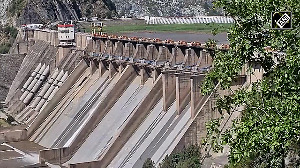Foreign Secretary Shyam Saran delivered this speech at the Heritage Foundation in Washington, DC on Thursday. The Heritage Foundation is a leading conservative think tank.
The foreign secretary is in Washington to confer with Bush administration officials and leading United States Congressmen and Senators before the crucial vote in the US Congress in April
I am privileged to have this opportunity to address such a distinguished audience at the invitation of the prestigious Heritage Foundation.
The Foundation enjoys the reputation as a zealous sentinel of the core values and principles that have made the United States a great nation. It is known for its passionate attachment to the heritage of freedom, to the celebration of diversity and for an enduring belief that sound policies require reasoned debate. I am given to understand that the Heritage Foundation is proud to begin its positions with the words, 'We believe'. These are qualities that, what Nobel Laureate Amartya Sen, has called 'the argumentative Indian', could easily identify with.
India and the United States have, in the past, been referred to as 'estranged democracies'. Today, we can declare with confidence that we are engaged democracies. How has this happened? I will not go into the familiar history of the Cold War and the various factors that prevented the emergence earlier of an enduring partnership between us despite a healthy and genuine mutual admiration.
 In recent years, our shared values ave been strengthened by the realisation of shared interests, leading to what Prime Minister Manmohan Singh described as a congruence between principle and pragmatism. This is key to an understanding of our unfolding strategic partnership.
In recent years, our shared values ave been strengthened by the realisation of shared interests, leading to what Prime Minister Manmohan Singh described as a congruence between principle and pragmatism. This is key to an understanding of our unfolding strategic partnership.
I will attempt today to share an Indian perspective of the international backdrop to this emerging congruence.
India perceives the world today as one where the global agenda is being set by a constellation of nations including the United States, the EU, Russia, China, Japan and India. The United States is, and for the foreseeable future, will remain a pre-eminent power. However, no single nation can bear global burdens alone and the current international situation is characterised by the willingness of major nations to work together on issues and challenges where they perceive strong convergence. The era when global politics was a zero-sum game is now decisively behind us. Leading nations, even when they compete, have inter-dependencies and linkages amongst themselves that they ignore at their own peril.
A second aspect of the current global polity is that power is judged by a much broader criteria that includes economic, technological, managerial and knowledge capabilities in addition to military capabilities.
A third characteristic is that globalisation has thrown up challenges that are trans-national and cross-cutting in nature. They require coordinated responses. These challenges include terrorism, energy security, pandemics, natural disasters and environment degradation.
Finally, there is now a wide spread perception that non-State actors are an important factor to be reckoned with, and will have a particular relevance to many of the key challenges faced by the international community. In this framework, the degree of convergence of values and interests between the major nations becomes the driving force of their bilateral relationship.
The transformation that has characterised Indo-US relations in recent years has been made possible precisely because these convergences have been expanding steadily, allowing us to now contemplate an agenda for our future.
The security convergence between two major democratic powers like the United States and India is a natural one. Its scope has been broadened by a realisation in both nations that our cooperation can not only advance our respective interests but prove beneficial to the regional and global situation as well.
Whether there is the threat of terrorism or piracy, the challenge of natural calamities like tsunamis or earthquakes, the dangers of WMD proliferation or the problems of pandemics, India and the United States have been able to work together increasingly closely because they both bring important and often complementary contributions to the table. Our cooperation on tsunami relief in Asia is a case in point.
I hope that Americans would increasingly appreciate that when an open society like India pursues its own interests, this is more likely than not to be of benefit to the United States.
The most telling example we have before us is in Afghanistan, where India is engaged in a massive development and reconstruction programme to stabilise that society. The success of our efforts in bringing electricity to Kabul or empowering Afghan women or fostering entrepreneurship and building an Afghan civil service are also all critical to the achievement of your own goals.
Our new defence framework is another reflection of this vision and the expansion of our military contacts and the prospects for equipment procurement and co-production are two important signs of the future direction of our ties. As our compatibility and comfort level in working together increase, our relationship will come to be viewed as a positive force in ensuring security and peace in the broader region. It will have particular value to a continent whose energies would be focussed on rapid economic growth and improving the living standards of our peoples.
The economic convergence between us has accelerated since the opening of the Indian economy a decade and a half ago. India's integration with the global economy created greater opportunities and prospects for Indo-US trade, investment and technology transfers. A more prosperous India with a growing middle class -- already estimated at 300 million plus -- will inevitably make more demands of US goods, technology and services. Accumulation of foreign exchange reserves is not viewed by us as an end objective by itself. We have also allowed our exchange rates to adjust to reflect changing economic fundamentals.
Our greater purchasing power has already led India to currently become the fastest growing export market for the US, rising at an estimated 30 per cent. In the civil aviation sector for example, domestic liberalisation coupled with the conclusion of an Open Skies agreement, has seen massive purchases of US aircraft. The demand for industrial machinery, that already constitutes one-third of total US exports, and of high technology, is bound to increase as the Indian economy becomes more sophisticated. We are currently focussed on making major investments to modernise our infrastructure including airports, ports, railways and roads, and to ensure greater energy availability.
Many of these areas are traditional American strengths and should certainly generate greater business for US companies. India is already an attractive destination for US companies and becoming more so as we further liberalise our investment policies. The profitability of foreign companies operating in India is among the highest in the world. A well-established stock market reflecting a booming economy has also become the subject of interest for American institutional investors.
The point I wish to stress is that there are growing opportunities that have just begun to unfold and are likely to last for many generations. In fact, trends indicate that the growth of agricultural prosperity in India would bring many more rural consumers into the market.
The demographics of India are the clearest proof that the demand pattern would continue to grow exponentially in the future.
The long-term nature of our economic partnership is further strengthened by the convergence based on skills availability in India and human resource needs of the US. An English speaking, pluralistic society with an open economy that produces graduates by the millions and engineers, and scientists and doctors by the hundreds of thousands, will be a natural long-term partner for the United States in the era of the knowledge economy. The 2020 Report on Mapping the Global Future brought this out very graphically in 2005.
In assessing the strength of this convergence, we have to also take into account that a pluralistic ethos and an open economy are ideal conditions for promoting the kind of creativity that is a must to sustain knowledge processes.
As we look into the future and make judgements on where vital skills are best located, US security would be well served if its major partner is another democratic society like India. It goes without saying that in a competitive society like India, investments in scientific research are likely to be cost effective for US companies.
The decisions made today on key research and technology initiatives will help shape the nature and politics of our inter-dependent world. It is, therefore, of particular satisfaction that in areas like fusion energy, clean coal and gas hydrates, the US has supported Indian participation in international research projects. This trend is only likely to accelerate further. Indian companies are already moving up the value chain in the knowledge economy. A leading American tech-trend forecaster recently commented to the BusinessWeekmagazine that millions of engineering, business and medical graduates in India are becoming enmeshed in the global new economy in ways most people are only now beginning to fathom.
I find it striking that the vast majority of initiatives that we have recently undertaken with the United States are technology driven. Their impact will be far reaching and the Knowledge Initiative on Agriculture, for example, can bring about second generation reforms that would build on our heritage of the Green Revolution. Equally, I would point to the US payloads on our own Lunar Mission as an example of India's relevance to US needs.
Underpinning all this is the fundamental convergence in our values and ethos. We are not just democracies but societies with truly composite, assimilative and inclusive cultures. In a world where the value of an open society and an open economy is increasingly apparent, India and the United States have a particular responsibility to uphold our commitment to our shared values.
India and the US are also in the forefront of the global effort to meet the challenge of terrorism fuelled by intolerant and fundamentalist ideologies. Our very existence as plural and secular societies, poses the most effective challenge to such ideologies. Neither can we afford to make tactical compromises, pursuing the war on terror in either a selective or segmented manner. This is a long-term effort and we are bound together by the conviction that democracy is the best defence against terrorism.
In July 2005, when Prime Minister Manmohan Singh visited Washington, India and the United States agreed on a very broad range of initiatives that underlined the transformation of our ties. The visit of President Bush to India this March witnessed the further evolution of our partnership. Several initiatives announced in July 2005 were developed into concrete policy decisions; some were actually implemented, even as new areas for cooperation were identified.
We succeeded in meeting the high expectations generated by the July 2005 visit and surprised observers in both countries by our ability to make major decisions in important and difficult areas. If the president and the prime minister expressed satisfaction at the progress that we had made, it was more than mere diplomatic ritual. Allow me to highlight some of the landmark announcements that defined the strength of our relationship:
-
Our efforts to promote economic prosperity and trade was underlined by the recommendations of the CEOs Forum contained in their first report. We agreed on an investment summit to take place in 2006 to promote FDI and expand bilateral trade.
-
In the key sector of agriculture, which lags significantly behind industry and services in its growth rate, steps were finalised to link our universities, technical institutions and businesses to enhance productivity and prepare the Indian farmer for the era of agricultural commerce. Certainly, there could be no better signal for this than the US opening its markets to Indian mangoes.
-
Our energy agenda was advanced through an agreement for Indian participation in the FutureGen clean coal near-zero emission research project, and an important international initiative on drilling for gas hydrates. Our quest for full civil nuclear energy cooperation also moved forward through the finalisation of the separation plan for India's civil nuclear energy programme that has allowed the introduction of relevant legislation to this end in the US Congress.
-
The growing importance of the knowledge economy to both societies was demonstrated by the establishment of our Bi-national Science and Technology Commission, the launch of an industrial R&D initiative, progress in commercial space launch arrangements, the carriage of US payloads in an Indian lunar mission and the announcement of high-technology license exceptions for civil end users in India.
-
The global character of our cooperation was reiterated through a reaffirmation of our cooperative approach on counter terrorism and defence, the conclusion of a cooperation framework to enhance security in the maritime domain, a commitment by India to participate in the Container Security Initiative, and a range of joint programmes on disaster relief, cyber security, democratic capacity building, combating HIV/AIDS and avian flu and on wildlife trafficking.
The issue that encapsulates all these convergences today is the prospect of resumption of full civil nuclear energy cooperation between India and the United States. This is an initiative that will determine -- for good reasons -- the direction of our future ties. It has a strong security rationale, as it would enable India to make a fuller contribution to global non-proliferation efforts.
India has already significantly strengthened its export controls and put in place measures to effectively deter leakage of sensitive technology. This builds on an exemplary non-proliferation record of four decades and more.
We have also made a commitment to refrain from transferring enrichment and reprocessing technologies to nations that do not have them, and to support international efforts to limit their spread.
But India cannot be a partner and a target at the same time. If there is an expectation that we should play a greater role, particularly in combating the twin threats of WMD proliferation and terrorism, then it is only reasonable that the energy requirements of a country with such strong credentials is recognised.
The economic rationale for this initiative is very compelling. Energy scarcity is the single biggest constraint on the Indian growth rate. An acceleration in India's progress will not only have dramatic anti-poverty consequences but would significantly strengthen the global economy.
Rapidly increasing the civil nuclear component of our total energy mix has a particular urgency when its emission implications are taken into account. The technology rationale for our cooperation is also a powerful one. Indian scientists now have much to bring to the table, especially in areas where they have established technology leads. Even in fields like reactor refurbishment, we are extremely innovative and competitive, and our activities outside India can expedite the global revival of the nuclear industry.
The issue of values is not an irrelevant one either as we need to ask ourselves whether the world would not be more secure if key technologies, operational experiences and skills reside in open societies like India.
I am, of course, aware that the nuclear initiative has been the subject of vigorous debate here, as it has been back home. We respect this debate, and indeed believe that our case will come out stronger after it is subjected to the rigorous scrutiny characteristic of democratic processes.
I am confident that at the end of the day, it will be recognised that India has large energy needs and that its responsible record makes it a reliable partner for the United States and the international community. Some surprise has been expressed that an initiative of this ambitious nature was undertaken with such confidence.
Let me underline that the nuclear initiative is a critical component, but at the same time, a natural evolution of the broader agenda that I have outlined earlier. It has been made possible only because Indo-US relations as a whole have developed so rapidly. If it is ambitious, that too reflects the larger goals that we have set for ourselves.
The question has been asked why, if Indo-US relations have progressed so well, is it necessary to undertake this particular initiative. Some have argued that the relationship is doing quite well without the need to do more. May I point out that a nuclear technology denial regime has a larger restrictive implication across the entire technology spectrum.
Some years ago, India faced difficulties in procuring a super-computer even for weather forecasting because of the nuclear driven export controls. The continuation of the status quo, therefore, constitutes a major impediment to realise the full potential of our knowledge economy partnership that is so important to the future of our two countries.
It has been asked why India, with only 3% of its energy production currently from nuclear sources, has put so much emphasis on civil nuclear energy cooperation. This begs the question whether the present quantum and mix in energy is currently satisfactory. The answer clearly is that it is not. If the nuclear element of the present mix is limited, it is only because of restrictive technology practices. In a more open market, it may be reasonably expected that we would undertake additional nuclear power projects, as we have in other facets of energy production.
There have been comments that our separation plan leaves open the possibility of a massive increase in our nuclear weapons programme. I would like to remind all of you of our record of responsibility, restraint -- and I would even say idealism -- in this regard. We were reluctant to exercise our nuclear weapon option to begin with. Having felt compelled to do so, we remain committed to a credible minimum deterrent.
If our posture so far has been one of restraint and responsibility -- not disputed even by our critics -- there is no reason why we should suddenly change now. Some aspersions have been cast on our technology control record. I would like to strongly underline that not only our non-proliferation record but even our export control record has been exemplary and includes the 1984 MoU with the US itself.
Doubts have been expressed whether making an exception for India would weaken the non-proliferation system and encourage other non-nuclear States that may harbour nuclear weapon ambitions. This is a false analogy.
No other state has the responsible record that India does and is denied access to civil nuclear energy technology.
Surely, a serial proliferator cannot warrant the same treatment as a law-abiding and responsible nation. It is for that reason that our case for greater energy access has garnered so much support.
To those who may still be weighing the merits of the nuclear understanding, I would urge them to think seriously: Does it serve global security if India remains outside the non-proliferation system? Will India's rising demands for oil and attendant implications for global oil prices help the world economy? What would be the emission consequences of greater consumption of fossil fuels?
Enacting legislation to reflect policy changes is not an easy process in any polity. We, in India, appreciate that having ourselves gone through the painstaking process of creating the political consensus for the passage of export control legislation last year. In fact, additional legislative measures will have to be contemplated by the Indian Parliament to realise the full potential of civil nuclear energy cooperation.
The nuclear understanding has not been without controversy in India but responding to the vision of the relationship before us, we have demonstrated the ability to make difficult decisions, in the course of extraordinarily challenging and complex negotiations. Our US interlocutors have been tough negotiators and the deal that we finalised on March 2, 2006 has been a fair one.
I hope that when the Congress examines this issue, they will have before them a vision of the scope and breath of our possible relationship -- one based on the congruence of principles and pragmatism that our Prime Minister has articulated -- and will link that to the nuclear agreement. The remarkable progress that we have made in so many facets of our relationship in recent years makes me confident that this vision will prevail.
Photograph: Paresh Gandhi







 © 2025
© 2025